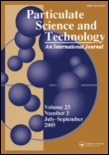
PARTICULATE SCIENCE AND TECHNOLOGY
Scope & Guideline
Transforming Understanding of Chemical Engineering
Introduction
Aims and Scopes
- Particle Characterization and Modeling:
This area includes studies on the physical and chemical properties of particles, employing various techniques such as CFD, DEM, and image analysis to understand particle behavior and interaction in different environments. - Separation and Filtration Technologies:
Research in this scope focuses on innovative methods for separating and filtering particulate materials, including electrostatic, magnetic, and mechanical approaches, aimed at enhancing efficiency and effectiveness in industrial applications. - Nanoparticle Synthesis and Applications:
The journal publishes works on the synthesis of nanoparticles using various methods, including green synthesis, and their applications in fields such as medicine, environmental remediation, and catalysis. - Fluidization and Pneumatic Conveying:
This research area investigates the dynamics of fluidized beds and pneumatic conveying systems, focusing on the behavior of particles under various flow conditions, which is crucial for optimizing industrial processes. - Environmental and Energy Applications:
Studies addressing the impact of particulate materials on environmental health and energy efficiency, including waste management and the development of sustainable technologies, are a significant focus. - Tribology and Wear Performance:
This scope examines the interactions between particles and surfaces, particularly in terms of wear and friction, to improve material performance in various applications.
Trending and Emerging
- Green Synthesis of Nanomaterials:
There is a growing emphasis on environmentally friendly methods for synthesizing nanoparticles, reflecting a broader trend towards sustainability in nanotechnology and materials science. - Advanced Computational Modeling:
The use of sophisticated computational models, such as CFD-DEM simulations, is on the rise, allowing for more accurate predictions of particle dynamics and interactions in complex systems. - Biomaterials and Biomedical Applications:
Research focusing on the use of particulate materials in biomedical applications, including drug delivery systems and tissue engineering, is gaining traction, reflecting the increasing intersection between materials science and health care. - Smart Materials and Responsive Systems:
Emerging studies on smart materials that respond to environmental stimuli (e.g., temperature, pH) are becoming more prevalent, showcasing innovation in material design for various applications. - Waste-to-Value Technologies:
There is a noticeable increase in research addressing the conversion of waste materials into valuable products, emphasizing the importance of circular economy principles in particulate technology. - Energy-efficient Separation Processes:
Research into energy-efficient and sustainable separation processes, particularly in the context of industrial applications, is becoming increasingly important as industries strive to reduce their environmental footprint.
Declining or Waning
- Traditional Material Processing Methods:
There appears to be a waning interest in conventional material processing techniques, such as basic milling and grinding, as researchers increasingly explore more innovative and sustainable methods like nanotechnology and advanced filtration systems. - Basic Characterization Techniques:
As the field advances, there is a noticeable decline in publications focusing solely on basic characterization techniques without integrating advanced methodologies like machine learning or high-throughput screening. - Single-Use or Low-Efficiency Processes:
Research on single-use processes or those with low efficiency is decreasing, as the industry and academia shift towards more sustainable and efficient processes, particularly in waste management and resource recovery. - Heuristic Models in Particle Behavior:
There seems to be a decline in the use of traditional heuristic models for predicting particle behavior, with a growing preference for data-driven approaches and simulations that provide more accurate and reliable results.
Similar Journals
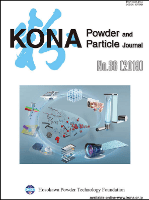
KONA Powder and Particle Journal
Exploring the frontiers of powder and particle science.KONA Powder and Particle Journal, published by the HOSOKAWA POWDER TECHNOL FOUNDATION since 1983, is a leading open-access journal dedicated to advancing research in the fields of powder technology and particle science. Situated in Japan, this journal serves as a vital platform for researchers, professionals, and students, offering a wealth of knowledge on various applications and innovations in Chemical Engineering, Chemistry, Engineering, and Materials Science. With an impressive Q2 ranking across multiple categories in 2023 and notable Scopus rankings that position it among the top journals in its field, KONA fosters collaboration and discovery by providing immediate and unrestricted access to groundbreaking research. The journal not only promotes the dissemination of high-quality articles but also emphasizes the practical implications of powder and particle technology in real-world applications, making it an essential resource for advancing scientific knowledge and industrial practices.
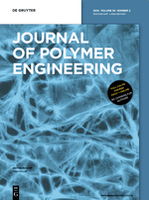
JOURNAL OF POLYMER ENGINEERING
Elevating Knowledge in Chemical Engineering.JOURNAL OF POLYMER ENGINEERING, published by Walter de Gruyter GmbH, stands as a pivotal platform in the field of polymer science and engineering. With an ISSN of 0334-6447 and an E-ISSN of 2191-0340, this journal has been a vital contributor to the academic landscape since its inception, spanning publications from 1981 to 2024. As a recognized entity in the realms of Chemical Engineering, Materials Chemistry, and Polymers and Plastics, it holds a respectable position in Q3 quartile rankings according to the latest assessments. The journal is positioned to promote the exchange of cutting-edge research findings, technological advancements, and critical reviews that address the complexities of polymer application and innovation. Researchers and professionals will find a wealth of information, from experimental methodologies to theoretical analyses, all designed to inspire and elevate the current understanding of polymer engineering. By fostering collaboration and dissemination of knowledge, the JOURNAL OF POLYMER ENGINEERING remains crucial for advancing research and education in its specialized domains.
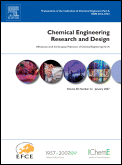
CHEMICAL ENGINEERING RESEARCH & DESIGN
Bridging Theory and Practice in Chemical Design.CHEMICAL ENGINEERING RESEARCH & DESIGN is a prestigious journal that has been at the forefront of dissemination in the fields of chemical engineering and general chemistry since its inception in 1983. Published by Elsevier, the journal features a rich array of research articles that contribute to both theoretical and practical advancements in the discipline. With an impact factor that positions it strongly within the Q2 quartile for both Chemical Engineering and Chemistry categories, it occupies an esteemed place in the academic community, being ranked #77 out of 273 in Chemical Engineering and #111 out of 408 in General Chemistry on Scopus. Researchers and professionals will find it an invaluable resource for cutting-edge research and innovative methodologies that shape the future of chemical engineering applications. While the journal does not currently offer open access, it remains accessible through institutional subscriptions, ensuring that important findings continue to reach a broad audience. With a scope that is poised to expand through 2024, the journal aims to foster collaboration and knowledge sharing, supporting the continuous evolution of the field.

Lubricants
Exploring the forefront of mechanical engineering and materials science.Lubricants, published by MDPI, is a prestigious, peer-reviewed open-access journal that has been dedicated to advancing the field of lubrication technology since its launch in 2013. With its E-ISSN of 2075-4442, the journal is based in Switzerland and has rapidly established itself as a vital resource in the domains of Mechanical Engineering and Materials Science, achieving Q2 quartile rankings in both fields as of 2023. Lubricants provides a platform for the dissemination of innovative research, offering insights into the performance, formulation, and applications of lubricants across various industries. With a commitment to fostering collaboration and knowledge-sharing, this journal attracts a global audience of researchers, professionals, and students eager to explore the latest developments in lubrication technologies. Open access since its inception, Lubricants ensures that all published works are freely available, promoting greater visibility and accessibility of cutting-edge research in the field.
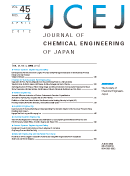
JOURNAL OF CHEMICAL ENGINEERING OF JAPAN
Illuminating Pathways for Future Chemical DiscoveriesJOURNAL OF CHEMICAL ENGINEERING OF JAPAN is a distinguished academic publication in the field of chemical engineering and chemistry, published by Taylor & Francis Ltd. With its ISSN 0021-9592 and E-ISSN 1881-1299, this journal has been a vital resource for researchers and practitioners since its inception in 1968 and continues to provide essential insights and advancements through 2024. The journal operates under an Open Access model as of 2023, promoting wider dissemination of research findings and encouraging collaboration within the global scientific community. Currently categorized in the Q4 quartile for both Chemical Engineering and Chemistry (miscellaneous) in 2023, it ranks within the lower percentiles of its respective fields, offering a platform for emerging scholars to publish their work and gain visibility. As part of Japan's academic landscape, it addresses numerous aspects of chemical engineering, fostering innovation and technical development that contribute to the industry's growth. Engaging with this journal is paramount for those looking to stay informed on the latest research trends and applications in chemical processes.
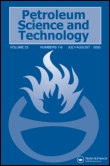
PETROLEUM SCIENCE AND TECHNOLOGY
Contributing to the evolution of petroleum science and technology.PETROLEUM SCIENCE AND TECHNOLOGY, published by Taylor & Francis Inc, is a pivotal journal dedicated to advancing the multidisciplinary field of petroleum engineering and related technologies. With an ISSN of 1091-6466 and an E-ISSN of 1532-2459, this journal serves as a vital platform for disseminating research in areas ranging from geotechnical engineering to energy technology. As of 2023, it is recognized in the Q3 quartile across several categories, including Chemical Engineering and Fuel Technology, signifying its respectable standing within the academic community. With a convergence timeline from 1997 to 2024, the journal continuously addresses crucial issues in the energy sector, making it essential reading for researchers, industry professionals, and policy-makers alike. Although not an open access journal, its rigorous peer-reviewed articles contribute significantly to the advancement of knowledge and innovation within these fields, reflecting the journal's commitment to promoting scientific understanding and practical applications.

Journal of Chemistry and Technologies
Connecting Ideas, Transforming Technologies.The Journal of Chemistry and Technologies, published by OLES HONCHAR DNIPROPETROVSK NATIONAL UNIVERSITY, is an open access journal dedicated to advancing knowledge in the broad fields of chemistry and chemical engineering since its inception in 2013. With ISSN 2663-2934 and E-ISSN 2663-2942, this journal provides a vital platform for researchers and professionals, particularly in Ukraine and beyond, to share innovative research findings and contemporary technological advancements. Currently ranked in the Q4 quartile in both Chemical Engineering and General Chemistry for 2023, it serves as an enriching resource for those interested in emerging trends and interdisciplinary studies within these domains. The journal adheres to high academic standards while fostering collaboration in the scientific community by offering open access articles that ensure visibility and accessibility to a global audience. As an important part of the academic landscape, the Journal of Chemistry and Technologies aims to inspire future research and development, paving the way for new discoveries and applications in chemistry-related fields.
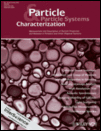
PARTICLE & PARTICLE SYSTEMS CHARACTERIZATION
Innovating Insights in Chemistry and PhysicsPARTICLE & PARTICLE SYSTEMS CHARACTERIZATION is a distinguished journal dedicated to advancing the knowledge within the fields of Chemistry, Condensed Matter Physics, and Materials Science. Published by WILEY-V C H VERLAG GMBH in Germany, this journal has established a solid reputation since its inception in 1984, showcasing research aimed at understanding the intricate properties and behaviors of particulate systems. With an impressive Q2 ranking in its respective categories and Scopus ranks indicating a robust standing in the global research community, it serves as an essential resource for researchers, professionals, and students. Although it does not currently offer Open Access options, its comprehensive articles and reviews provide valuable insights that contribute significantly to the ongoing discourse in these scientific domains. As it prepares to celebrate four decades of publication, PARTICLE & PARTICLE SYSTEMS CHARACTERIZATION continues to provide a vital platform for emerging knowledge, fostering innovation and collaboration among scientists dedicated to the study of particle systems.
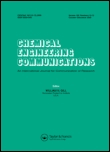
CHEMICAL ENGINEERING COMMUNICATIONS
Fostering Collaboration in Chemical Engineering Excellence.Chemical Engineering Communications, published by Taylor & Francis Inc, is a distinguished journal within the realms of Chemical Engineering and Chemistry. With an ISSN of 0098-6445, this journal plays a pivotal role in disseminating innovative research, critical reviews, and insightful discussions that encompass a broad spectrum of topics in these fields. The journal boasts a commendable Q2 ranking in the 2023 category of chemical engineering and general chemistry, reflecting its significant contribution to the scientific community. Operating under a rigorous peer-review process, the journal attracts high-quality submissions from global researchers. Although currently not an Open Access journal, it provides extensive archive access for users interested in exploring past advancements from its inception in 1973 through to 2024. With a commitment to advancing knowledge and fostering collaboration among academia and industry, Chemical Engineering Communications remains an essential resource for professionals and students aiming to stay abreast of the latest developments in chemical sciences.
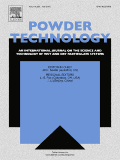
POWDER TECHNOLOGY
Elevating Standards in Powder Technology ResearchPOWDER TECHNOLOGY is a prestigious journal published by Elsevier, focusing on the vital field of powder technology within chemical engineering. With an impressive impact factor and ranked in the top percentile (88th) of Scopus, this journal has secured its position as a leading resource, classified in the Q1 category of Chemical Engineering (miscellaneous). The journal brings together groundbreaking research and innovative developments in powder processing, characterization, and application, making it an essential publication for researchers, professionals, and students interested in advancing knowledge and practices in this dynamic field. Established in 1967 and continuously evolving with a scope that encompasses the intersection of material science and engineering processes, POWDER TECHNOLOGY embodies a commitment to fostering scientific inquiry and sharing knowledge. Researchers can access relevant articles through a comprehensive platform, ensuring timely dissemination of findings that are critical for both academia and industry.